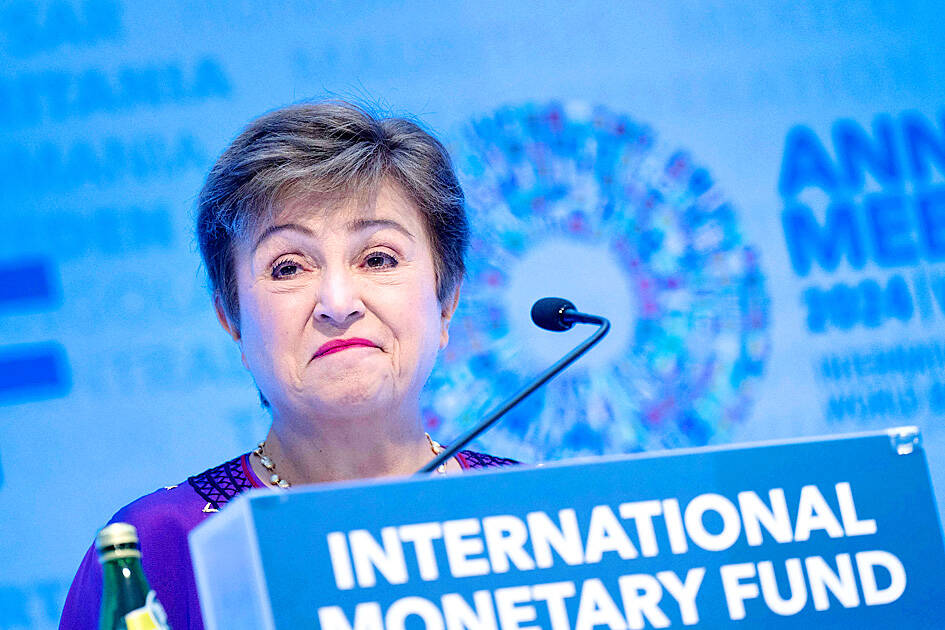US president-elect Donald Trump’s tariff threats are already driving up longer-term borrowing costs around the world, IMF Managing Director Kristalina Georgieva said.
Uncertainty about the incoming administration’s trade policies is adding to worldwide economic headwinds and “is actually expressed globally through higher long-term interest rates,” Georgieva told reporters in Washington on Friday last week.
That is happening even as short-term rates have gone down, a “very unusual” combination, she said.

Photo: AFP
Trump, who is to take office on Jan. 20, has vowed to slap new charges on imports from US adversaries such as China, as well as allies including Canada and Mexico, raising concerns that supply-chain disruption would slow economic growth and push prices higher.
IMF chief economist Pierre-Olivier Gourinchas warned in October last year that tariffs and trade uncertainty could reduce global output by about 0.5 percent.
The closing weeks of last year and first days of the new year have seen sharp increases in bond yields across much of the world and a surge in the US dollar, as investors weigh the likely impact of Trump’s second-term policies.
“Not surprisingly, given the size and role of the US economy, there is keen interest globally in the policy directions of the incoming administration, in particular on tariffs, taxes, deregulation and government efficiency,” Georgieva said.
The impact from US trade policies would be most acute on countries and regions integrated with global supply chains, including many medium-sized economies and Asia as a region, she added.
The greenback’s strength “could fuel higher funding costs for emerging economies and especially for low-income countries,” she said.
US economic numbers, including Friday last week’s blockbuster jobs report, show that the US Federal Reserve “can afford to wait for more data before making further cuts” to its benchmark interest rate, she said.
The IMF has been warning since the COVID-19 pandemic of mediocre growth prospects for the global economy. In October last year, it predicted a 3.2 percent expansion this year, a forecast that is due to be revised on Friday when the fund publishes an update of its World Economic Outlook.
Georgieva hinted that the overall number would not change much, saying that the IMF sees “global growth holding steady,” but she pointed to significant divergences.
“The US is doing quite a bit better than we expected before,” she said.
By contrast, the EU is “somewhat stalling,” India “a little weaker,” and China is facing challenges from deflationary pressure and low domestic demand.

The US dollar was trading at NT$29.7 at 10am today on the Taipei Foreign Exchange, as the New Taiwan dollar gained NT$1.364 from the previous close last week. The NT dollar continued to rise today, after surging 3.07 percent on Friday. After opening at NT$30.91, the NT dollar gained more than NT$1 in just 15 minutes, briefly passing the NT$30 mark. Before the US Department of the Treasury's semi-annual currency report came out, expectations that the NT dollar would keep rising were already building. The NT dollar on Friday closed at NT$31.064, up by NT$0.953 — a 3.07 percent single-day gain. Today,

‘SHORT TERM’: The local currency would likely remain strong in the near term, driven by anticipated US trade pressure, capital inflows and expectations of a US Fed rate cut The US dollar is expected to fall below NT$30 in the near term, as traders anticipate increased pressure from Washington for Taiwan to allow the New Taiwan dollar to appreciate, Cathay United Bank (國泰世華銀行) chief economist Lin Chi-chao (林啟超) said. Following a sharp drop in the greenback against the NT dollar on Friday, Lin told the Central News Agency that the local currency is likely to remain strong in the short term, driven in part by market psychology surrounding anticipated US policy pressure. On Friday, the US dollar fell NT$0.953, or 3.07 percent, closing at NT$31.064 — its lowest level since Jan.

The New Taiwan dollar and Taiwanese stocks surged on signs that trade tensions between the world’s top two economies might start easing and as US tech earnings boosted the outlook of the nation’s semiconductor exports. The NT dollar strengthened as much as 3.8 percent versus the US dollar to 30.815, the biggest intraday gain since January 2011, closing at NT$31.064. The benchmark TAIEX jumped 2.73 percent to outperform the region’s equity gauges. Outlook for global trade improved after China said it is assessing possible trade talks with the US, providing a boost for the nation’s currency and shares. As the NT dollar

The Financial Supervisory Commission (FSC) yesterday met with some of the nation’s largest insurance companies as a skyrocketing New Taiwan dollar piles pressure on their hundreds of billions of dollars in US bond investments. The commission has asked some life insurance firms, among the biggest Asian holders of US debt, to discuss how the rapidly strengthening NT dollar has impacted their operations, people familiar with the matter said. The meeting took place as the NT dollar jumped as much as 5 percent yesterday, its biggest intraday gain in more than three decades. The local currency surged as exporters rushed to